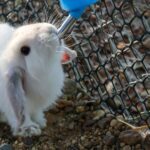Colored popsicle sticks are a popular choice for DIY projects and crafts, but have you ever wondered if they are safe for your furry friend? If you’re a rabbit owner, you may be considering using these sticks as a toy or chew for your pet. However, before introducing any new item into your rabbit’s environment, it’s essential to consider their safety.
As a responsible rabbit owner, you want to provide your pet with the best possible care. This includes ensuring that any toys or chews you give them are safe and free from potential hazards. Colored popsicle sticks are a popular option for many pet owners, but it’s important to understand whether they are suitable for rabbits.
Keeping your rabbit happy and healthy is essential, and providing them with stimulating toys and chews can be an excellent way to do so. However, it’s crucial to ensure that any item you give them is safe and suitable for their needs.
If you’re considering using colored popsicle sticks for your rabbit, you’ll want to learn more about the potential risks and benefits before making a decision.
Composition of Colored Popsicle Sticks
Popsicle sticks are made of wood, typically birch wood, that is dried and cut into thin, flat pieces. These pieces are then polished and shaped into the recognizable popsicle stick form. The wood used to make popsicle sticks is usually untreated and unpainted, making them safe for rabbits to chew on.
However, many popsicle sticks available today come in a range of colors, which can be achieved by using dyes or pigments. These colorants can be made from natural or synthetic sources, and their composition can vary widely depending on the manufacturer. Some colorants may contain chemicals that can be harmful to rabbits if ingested.
Potential Hazards of Colored Popsicle Sticks
Ingestion
Rabbits are known for their love of chewing, and popsicle sticks can be a tempting target for them. If a rabbit chews on a colored popsicle stick, they may ingest some of the dye or pigment used to color it. Depending on the composition of the colorant, this could pose a risk to the rabbit’s health.
Synthetic Colorants
Synthetic colorants, for example, may contain chemicals such as lead, which can be toxic to rabbits if ingested in large amounts. Lead poisoning can cause a range of symptoms in rabbits, including loss of appetite, lethargy, diarrhea, and seizures. In severe cases, lead poisoning can be fatal.
Natural Colorants
Even natural colorants can be harmful to rabbits if ingested in large amounts. Some natural dyes, such as those derived from plants like rhubarb and spinach, contain oxalates, which can cause kidney damage in rabbits if consumed in excessive quantities.
Choking
In addition to the potential health risks posed by the colorants in colored popsicle sticks, rabbits can also choke on small pieces of wood that break off as they chew. If a rabbit ingests a large piece of wood, it can cause a blockage in their digestive system, which can be life-threatening.
Tips for Using Popsicle Sticks Safely
Avoid Using Colored Popsicle Sticks
Reduce the risk of harm to your rabbit, it is best to avoid using colored popsicle sticks altogether. Instead, stick to untreated, unpainted popsicle sticks that are made solely from birch wood. These sticks are safe for rabbits to chew on and can provide them with a stimulating activity that helps keep their teeth healthy.
Monitor Your Rabbit
If you do choose to use colored popsicle sticks, be sure to monitor your rabbit closely while they are chewing on them. If you notice any signs of discomfort or distress, remove the popsicle stick immediately and contact your veterinarian.
It is also important to dispose of any broken or small pieces of wood to prevent your rabbit from accidentally ingesting them.
The Benefits And Drawbacks Of Using Colored Popsicle Sticks As Toys Or Chews For Rabbits
Here are some of the benefits of using colored popsicle sticks as toys or chews for rabbits:
- Inexpensive: Colored popsicle sticks are a low-cost option for pet owners looking to provide a source of mental and physical stimulation for their rabbits.
- Convenient: Colored popsicle sticks can be purchased at most craft stores or online retailers, making them easy to obtain.
- Stimulating: Chewing on popsicle sticks can provide a fun and engaging activity for rabbits, helping to prevent boredom and encourage natural chewing behavior.
- Interactive: Colored popsicle sticks can be used to create interactive toys for rabbits, such as puzzles or mazes, which can challenge a rabbit’s problem-solving skills.
- Safe: As long as they are used properly and monitored closely, colored popsicle sticks can be a safe option for rabbits to chew on.
- Variety: Colored popsicle sticks come in a variety of colors, making it easy for pet owners to create colorful and engaging toys for their rabbits.
- Mental health: Chewing on popsicle sticks can help promote mental well-being in rabbits by providing them with a stimulating activity.
- Environmental enrichment: Using colored popsicle sticks as toys or chews for rabbits can be a form of environmental enrichment, which can improve the overall quality of life for rabbits in captivity.
Here are some of the drawbacks of using colored popsicle sticks as toys or chews for rabbits:
- Toxicity: Colored popsicle sticks may contain synthetic colorants that can be toxic to rabbits if ingested in large amounts.
- Choking hazard: If a colored popsicle stick breaks apart while being chewed, it can pose a choking hazard to rabbits.
- Blockages: If a rabbit ingests a large piece of colored popsicle stick, it can cause a blockage in their digestive system, which can be life-threatening.
- Dental health: While chewing on popsicle sticks can help keep a rabbit’s teeth healthy, they may not be as effective as other types of chews specifically designed for this purpose.
- Quantity: Overuse of colored popsicle sticks can lead to a high intake of wood fiber, which can negatively impact a rabbit’s digestive system.
- Limited use: Colored popsicle sticks should be used in moderation and supplemented with other types of chews to provide a well-rounded diet and prevent boredom.
- Quality control: The quality of colored popsicle sticks may vary, and it can be difficult to know exactly what chemicals and additives have been used in the manufacturing process.
Alternative Safe Toys and Chews for Rabbit
There are many safe and effective alternatives to colored popsicle sticks that pet owners can use as toys or chews for their rabbits. Here are some examples:
Untreated wood blocks or sticks
Untreated wood blocks or sticks can be a safe and effective alternative to colored popsicle sticks. Make sure the wood is untreated and free of any sharp edges or splinters that could harm your rabbit.
Willow balls or sticks
Willow balls or sticks are safe and natural toys that rabbits can chew on. They can also provide a source of mental and physical stimulation.
Cardboard boxes or tubes
Cardboard boxes or tubes can be used to create tunnels or hiding spots for rabbits. They can also be chewed on and provide a fun and stimulating activity.
Hay cubes
Hay cubes are designed to promote dental health in rabbits and can provide a safe and nutritious chew option.
Apple wood sticks
Apple wood sticks are a safe and natural option for rabbits to chew on. They can provide a source of mental and physical stimulation, as well as help keep teeth healthy.
Seagrass mats
Seagrass mats can be used as a natural and safe alternative to colored popsicle sticks. They are designed to promote natural chewing behavior and provide environmental enrichment.
When selecting toys or chews for your rabbit, it is important to choose options that are safe and appropriate for their size and chewing habits.
The Importance Of Monitoring Your Rabbit’s Behavior And Health When Giving Them Toys Or Chews
It is important to monitor your rabbit’s behavior and health when giving them toys or chews for several reasons:
Safety
Some toys or chews may pose a safety risk if they are not used properly or if they are ingested in large quantities. Monitoring your rabbit’s behavior and health can help you identify any potential safety concerns and take appropriate action to prevent harm.
Digestive health
Rabbits have a unique digestive system that requires them to constantly chew on fibrous materials to maintain proper gut health. Overuse of certain toys or chews, such as colored popsicle sticks, can lead to an excess of wood fiber in the digestive system, which can cause health problems. Monitoring your rabbit’s behavior and health can help you ensure they are getting an appropriate amount of fiber and prevent digestive issues.
Mental health
Rabbits are social animals that require mental stimulation and environmental enrichment to maintain good mental health. Monitoring your rabbit’s behavior and health when giving them toys or chews can help you identify whether they are getting enough mental stimulation and make adjustments as needed.
Dental health
Chewing on appropriate toys and chews can help keep your rabbit’s teeth healthy and prevent dental problems. Monitoring your rabbit’s behavior and health can help you ensure they are using toys and chews properly to promote good dental health.
Allergies of sensitiveness
Some rabbits may have allergies or sensitivities to certain materials or ingredients found in toys or chews. Monitoring your rabbit’s behavior and health can help you identify any allergic reactions or sensitivities and take appropriate action to prevent further harm.
Key Takeaways
- Monitoring your rabbit’s behavior and health when giving them toys or chews is important for promoting their overall health and well-being.
- It can help you identify and address any potential safety concerns, digestive issues, mental health concerns, dental problems, or allergies or sensitivities.
- When selecting toys or chews for your rabbit, it is important to choose options that are safe and appropriate for their size and chewing habits.


